|
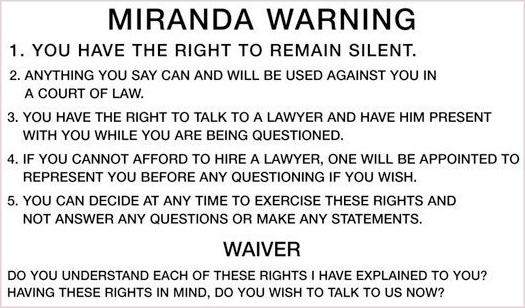
Miranda Warning Card (Houston Criminal Law Journal)
Via Grace Huemme's
Judicial Review Site
Miranda: The Right to Remain Silent
Also
called the Miranda Warning,
the Miranda Rights were established
by the U.S. Supreme Court ruling of
the landmark case Miranda v.
Arizona on June 13, 1966.
Welcome to Criminal Law.
In a nutshell, the Court's
decision underscored the Fifth Amendment, calling special
attention to a person's right to protect themselves against
self-incrimination.
The ruling further emphasized
the Sixth Amendment, the right to counsel, and the
Fourteenth Amendment, the right to a due process of law.
In practical terms, this decision
put into place a specific code of
conduct for police interrogations of suspects in
custody. Law enforcement officers were now required to
inform criminal suspects of their rights.
This is the
 Fifth Amendment of
the U.S. Constitution:
Fifth Amendment of
the U.S. Constitution:
No person shall be held to answer for a
capital, or otherwise infamous crime, unless
on a presentment or indictment of a grand
jury, except in cases arising in the land or
naval forces, or in the Militia, when in
actual service in time of war or public
danger; nor shall any person be subject for
the same offense to be twice put in jeopardy
of life or limb; nor shall be compelled in
any criminal case to be a witness against
himself, nor be deprived of life, liberty,
or property, without due process of law; nor
shall private property be taken for public
use, without just compensation.
This is the
 Sixth Amendment of
the U.S. Constitution:
Sixth Amendment of
the U.S. Constitution:
In all criminal prosecutions, the accused
shall enjoy the right to a speedy and public
trial, by an impartial jury of the state and
district wherein the crime shall have been
committed, which district shall have been
previously ascertained by law, and to be
informed of the nature and cause of the
accusation; to be confronted with the
witnesses against him; to have compulsory
process for obtaining witnesses in his
favor, and to have the assistance of counsel
for his defense.
This is Section 1 of the
 Fourteenth Amendment of
the U.S. Constitution:
Fourteenth Amendment of
the U.S. Constitution:
All persons born or naturalized in the
United States, and subject to the
jurisdiction thereof, are citizens of the
United States and of the State wherein they
reside. No State shall make or enforce any
law which shall abridge the privileges or
immunities of citizens of the United States;
nor shall any State deprive any person of
life, liberty, or property, without due
process of law; nor deny to any person
within its jurisdiction the equal protection
of the laws.
This is the
Supreme Court of 1966:
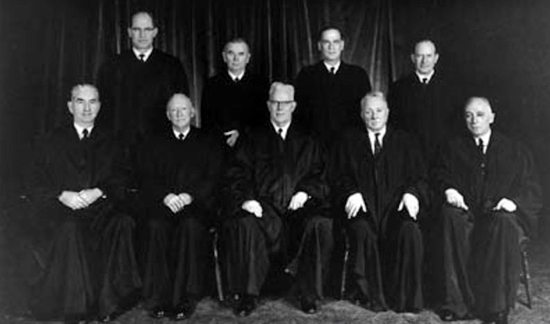
The Supreme Court in 1966, Led by Chief Justice Earl Warren
Back Row Left to Right: Justices White, Brennan, Stewart,
Fortas
Front Row Left to Right: Justices Clark, Black, Warren,
Douglas, Harlan
Photo: Brooklyn College
And this is
Ernesto Miranda:
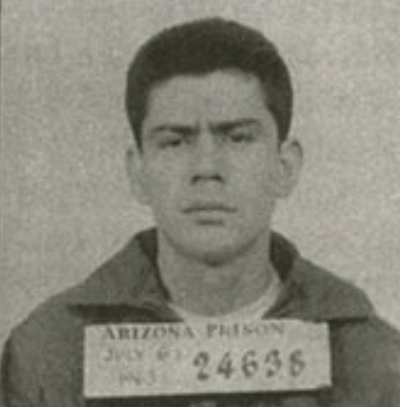
Ernesto Miranda
Mug Shot
Arizona Department of
Corrections
Now . . .
Ernesto
Miranda's Case
On March 13, 1963, in Phoenix,
Arizona, Ernesto Arturo Miranda was arrested at his home.
After two hours of interrogation
at
a Phoenix police station, Miranda signed a written confession. This confession stated
that it was made "with full knowledge of my legal rights,
understanding any statement I make may be used against
me."
At his trial before a jury,
Miranda was found guilty of kidnapping and rape and was
sentenced to 20 to 30 years imprisonment on each count, the
sentences to run concurrently.
Miranda appealed and the case
went before the Supreme Court of Arizona, which held that Miranda's constitutional rights were
not violated in obtaining the confession and affirmed the
conviction.
In reaching its
decision, the court pointed out the
fact that Miranda did not specifically request counsel.
This case went before the U.S.
Supreme Court, which reversed the conviction, because,
From the testimony of the officers and by the
admission of respondent, it is clear that Miranda was not in
any way apprised of his right to
consult with an attorney and to have one present during the
interrogation, nor was his right not to be compelled to
incriminate himself effectively protected
in any other manner.
Without these warnings the statements
were inadmissible.
The mere fact that he signed a statement
which contained a typed-in
clause stating that he had "full knowledge" of his "legal
rights" does not approach the knowing and intelligent waiver
required to relinquish constitutional
rights.
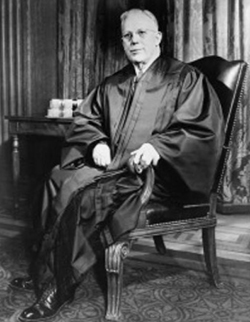
Chief Justice of the Supreme Court
Earl Warren
December 4, 1953
Courtesy of the Prints and
Photographs Division of the Library of Congress
The Supreme
Court's Decision in More Detail
Miranda v. Arizona, 384 U.S.
436, 759 (1966) was argued for three days, from February 28
- March 2, 1966. Its decision came on Monday, June 13, 1966,
in favor of Miranda with 5 votes against 4.
The majority opinion was written
by Chief Justice Warren and joined by Justices
Black,
Douglas,
Brennan, and
Fortas.
The dissenting opinion was
written by Justice Harlan and joined by Justices
Stewart and
White. Dissenting in part was Justice
Clark.
More Than One
Case
On that day, the Court decided
on several similar cases. In none of these cases was the
defendant given a full and effective warning of his rights
before the interrogation process.
No. 759
Miranda v. Arizona (oral arguments for
Miranda by John J. Flynn, for Arizona by
Gary K. Nelson, also for Miranda for the
National District Attorneys Association as
amicus curiae Duane R. Nedrud)
No 760 Vignera
v. New York
No 761
Westover v. United States
No 584
California v. Stewart
Chief Justice Warren wrote:
In the cases
before us today, given this background, we
concern ourselves primarily with this
interrogation atmosphere and the evils it
can bring.
In No. 759,
Miranda v. Arizona, the police arrested the
defendant and took him to a special
interrogation room where they secured a
confession.
In No. 760,
Vignera v. New York, the defendant made oral
admissions to the police after interrogation
in the afternoon, and then signed an inculpatory statement upon being questioned
by an assistant district attorney later the
same evening.
In No. 761,
Westover v. United States, the defendant was
handed over to the Federal Bureau of
Investigation by local authorities after
they had detained and interrogated him for a
lengthy period, both at night and the
following morning. After some two hours of
questioning, the federal officers had
obtained signed statements from the
defendant.
Lastly, in No.
584, California v. Stewart, the local police
held the defendant five days in the station
and interrogated him on nine separate
occasions before they secured his inculpatory statement.
[...]
Therefore, in
accordance with the foregoing, the judgments
of the Supreme Court of Arizona in No. 759,
of the New York Court of Appeals in No. 760,
and of the Court of Appeals for the Ninth
Circuit in No. 761 are reversed. The
judgment of the Supreme Court of California
in No. 584 is affirmed.
It is so
ordered.
Why For Miranda
Chief Justice Warren wrote:
The Fifth Amendment privilege is
so fundamental to our system of constitutional rule and the
expedient of giving an adequate warning as to the
availability
of the privilege so simple, we will not pause to inquire in
individual cases whether the defendant was aware of his
rights without a warning being given.
Assessments of the knowledge the defendant possessed, based
on information as to his age, education, intelligence, or
prior contact with authorities,
can never be more than speculation; 38 a warning is a
clearcut fact.
More important, whatever the background of
the person interrogated, a warning at
the time of the interrogation is indispensable to overcome
its pressures and to insure that the individual knows he is
free to exercise the privilege at that
point in time.
[...]
As Mr. Justice
Brandeis once observed:
"Decency,
security and liberty alike demand that
government officials shall be subjected to
the same rules of conduct that are commands
to the citizen ... "
[...]
Why Against
Miranda
Mr. Justice Clark voted against
Miranda. He wrote:
The obvious underpinning of the
Court's decision is a deep-seated distrust of all
confessions.
As the Court declares that the accused may not
be
interrogated without counsel present, absent a waiver of the
right to counsel, and as the Court all but admonishes the
lawyer to advise the accused to
remain silent, the result adds up to a judicial judgment
that evidence from the accused should not be used against
him in any way, whether compelled or
not.
This is the not so subtle overtone of the opinion --
that it is inherently wrong for the police to gather
evidence from the accused himself.
And this is
precisely the nub of this dissent.
I see nothing wrong or
immoral, and certainly nothing unconstitutional, in the
police's asking a suspect whom they have
reasonable cause to arrest whether or not he killed his wife
or in confronting him with the evidence on which the arrest
was based, at least where he has
been plainly advised that he may remain completely silent,
see Escobedo v. Illinois, 378 U.S. 478, 499 (dissenting
opinion).
Until today, "the admissions
or confessions of the prisoner, when voluntarily and freely
made, have always ranked high in the scale of incriminating
evidence." Brown v. Walker, 161
U.S. 591, 596; see also Hopt v. Utah, 110 U.S. 574, 584-585.
Particularly when corroborated, as where the police have
confirmed the accused's
disclosure of the hiding place of implements or fruits of
the crime, such confessions have the highest reliability and
significantly contribute to the certitude
with which we may believe the accused is guilty.
Moreover,
it is by no means certain that the process of confessing is
injurious to the accused. To the
contrary it may provide psychological relief and enhance the
prospects for rehabilitation.
[...]
The rule announced today will
measurably weaken the ability of the criminal law to perform
these tasks.
It is a deliberate calculus to prevent
interrogations, to reduce the incidence of confessions and
pleas of guilty and to increase the number of trials.
[...]
Applying the traditional
standards to the cases before the Court, I would hold these
confessions voluntary. I would therefore affirm in Nos. 759,
760, and
761, and reverse in No. 584.
In Practical
Terms
With regards to the implementation of Miranda Warnings, the Commission on Peace Officer
Standards and Training of the State of California issued a
legal
guide titled Interrogation and Miranda.
Here are some excerpts from its
August 10, 1995, edition:
GIVING THE MIRANDA WARNINGS
1. Law enforcement officers
sometimes add gratuitous enlargements to the Miranda
warnings that may reduce opportunities to obtain an
admission or confession.
The following example is what
the courts have said is necessary. Police officers should
ask the suspect if he understands after each part of the
Miranda advisement is given.
For example:
a. "You have the right to remain
silent. Do you understand?" Suspect answers.
b. "Anything you say may be used
against you in court. Do you understand?" Suspect answers.
Warning a suspect that his
statements may be used against him in court is
sufficient; it is not necessary (or necessarily accurate) to
assert that statements "can and will" be used as evidence.
People v. Valdivia (1986) 180 CA3d 657, 664.
c. "You have the right to an
attorney before questioning. Do you understand?" Suspect
answers.
A warning that the suspect has a
right to an attorney before questioning is not inadequate for failing to add that the right also applies
during questioning. People v. Valdivia (1986) 180
CA3d 657, 663.
Likewise, advice as to the right
to counsel "while you are being questioned" is not deficient
for failing to indicate the existence of that right before questioning.
People v. Kelly (1990) 51 C3d
931, 948-949.
d. "If you cannot afford an
attorney, one will be appointed for you free of charge,
before questioning, if you wish. Do you understand?" Suspect answers.
2. It is not necessary for
police officers to get express waivers from suspects before
questioning. However, if police officers want express
waivers, they should then ask: "Do you want to talk about what happened?"
3. Asking if the suspect wants
an attorney is not necessary. Moran v. Burbine
(1986) 475 US 412, 423.
4. Where a timely warning and
waiver have occurred, there is no requirement that a suspect
be readvised of his rights each time interrogation is
renewed within a reasonably contemporaneous period. Wyrick N. Fields
(1982) 459 US 42, 48.
5. Since the warnings serve to
protect custodial suspects exposed to police interrogation
"without the assistance of counsel," warnings are not
necessary where counsel accompanies the suspect. Roberts v. U.S.
(1980) 445 US 552, 560-561.
6. Miranda does not apply to
questioning aimed at neutralizing an immediate threat to
public or officer safety. New York v. Quarles (1984)
467 US 649, 657.
a. Not required when an officer
attempts to locate a discarded firearm in a public place. US v. DeSantis (CA 9 1989) 870 F2d 536;
People v.
Gilliard (1987) 189 CA3d 285, 291-292.
b. Not required when officers
ask questions in concern for their safety. Miranda was not
required when an officer was fearful of attack and asked the
suspect about dangerous weapons US v. Brady (CA 9
1984) 819 F2d 884; US v. De Santis (CA 9 1989) 870
F2d 536), or when asking a person if he had any hypodermic needles on his person before searching to avoid a hazardous
substance exposure of the searching officer.
c. Not required when an officer
asks questions attempting the rescue of kidnap victims.
7. Questioning by an undercover
officer posing as a fellow prisoner, lacking the inherent
compulsion of recognizable police interrogation, does not
require warnings. Illinois v. Perkins (1990) 496 US 292, 300;
People v. Wojtokowski (1985) 167 CA3d 1077, 1081.
Earl Warren
Trivia
The son of Scandinavian
immigrants, Earl Warren was born on March 19, 1891, in Los
Angeles, CA. He died on July 9, 1974, in Washington D.C.
 Dwight D. Eisenhower appointed
fellow Republican, California Governor Earl Warren as the
14th chief justice of the Supreme Court in 1953. Warren
served as such until 1969.
Dwight D. Eisenhower appointed
fellow Republican, California Governor Earl Warren as the
14th chief justice of the Supreme Court in 1953. Warren
served as such until 1969.
On May 17, 1954, in Brown v.
Board of Education of Topeka, Warren's Supremes ruled unanimously (9-0) against racial segregation in public
schools.
On June 25, 1962, in Engel v.
Vitale, Warren's Supreme Court ruled 6-1 to declare
mandatory school prayer in public schools unconstitutional.
On November 29, 1963,
 President
Lyndon B. Johnson appointed Earl Warren head of the
President's Commission on the Assassination of
President
Lyndon B. Johnson appointed Earl Warren head of the
President's Commission on the Assassination of
 President
John F. Kennedy, aka the
Warren Commission.
President
John F. Kennedy, aka the
Warren Commission.
What Happened to
Ernest Miranda?
According to the Arizona State
Library, Archives and Public Records:
In 1967 Miranda was retried for
the kidnapping and rape charge and in 1971 for the robbery
charge. He was again found guilty of all crimes. Miranda was
granted parole in 1972 and was back in prison 1974-1975.
While out he made extra money by
autographing and hawking the Miranda warning cards law
officers used.
On the evening of January 31,
1976, Ernest Miranda was stabbed to death while in a fight
over a $3 gambling pot.
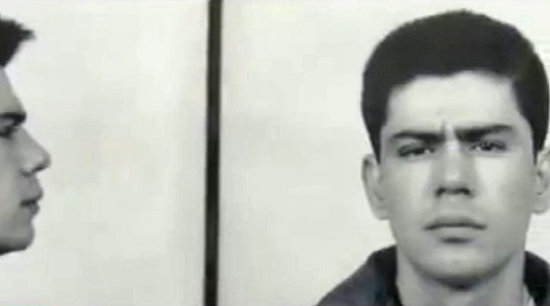
Ernesto
Miranda Mug Shot
Phoenix Police Museum
What Happened to
the Other Guys?
According to Michael Burgan's
2007 Miranda V. Arizona: The Rights
of the Accused,
Like Miranda, Michael Vignera,
Carl Calvin Westover, and Roy Allen Stewart received new
trials after the Supreme Court's ruling on their cases. And
like Miranda, each was convicted again for their crimes.
Westover received a 30-year sentence, and Stewart was given
a life sentence. Vignera, however, had his original sentence
reduced from 30-60 years to 7 1/2 - 10 years.
What Else?
Here, you can read the entire text of
the
 Supreme Court decision Miranda v.
Arizona.
Supreme Court decision Miranda v.
Arizona.
And here, you can visit the
 Phoenix Police Museum
which includes a Miranda exhibit.
Phoenix Police Museum
which includes a Miranda exhibit.
More History
|